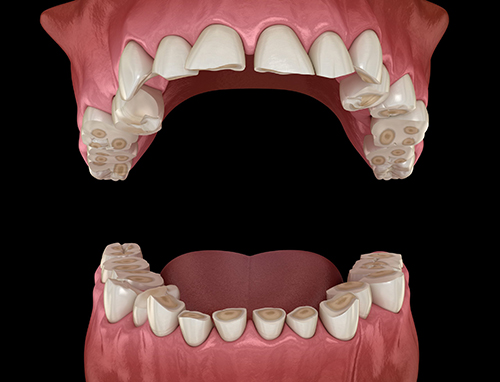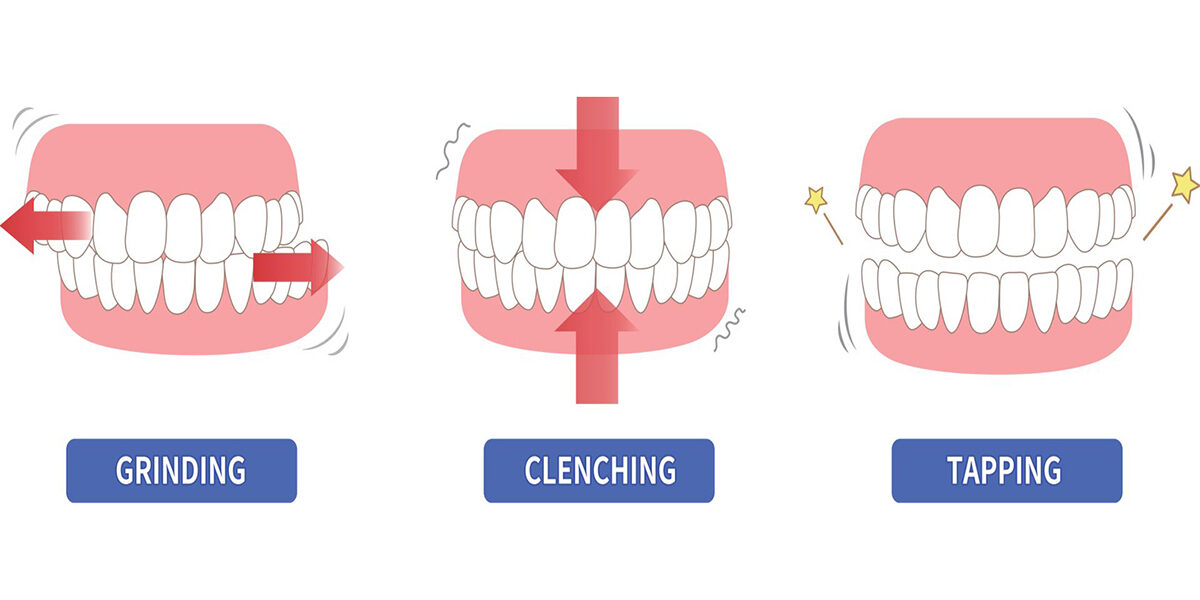4 Symptoms of Bruxism & the TMJ and effects on teeth.
Did you realize that grinding your teeth might have an impact on your mouth’s overall health? It may be detrimental to both your teeth and TMJ! Continue reading this blog to find out more about bruxism and some practical advice for preventing the issues it can lead to.
Bruxism: What Is It?
The practice of clenching and grinding your teeth is known as bruxism. This usually occurs while you’re stressed out or asleep. It could be unintentional or conscious. Bruxism can appear as biting, clenching, or grinding on little items at times.
Headaches in the morning are a sign of bruxism.
Jaw ache.
A toothache.
Dental wear.
TMJ: What Is It?
The joint that joins your mouth to your skull is called the temporomandibular joint, or TMJ, and it’s situated beneath your ears. TMJ dysfunction, often known as TMD, is the term used to describe joint disorders. Stress, bruxism, and jaw misalignment are the causes of TMD.
Headaches in the morning are a sign of TMJ.
Jaw ache.
Jaw popping or clicking.
Jaw locked.
Discomfort during chewing.
Why Do Teeth Become Healthy?
Teeth free from TMJ or Bruxism can function optimally. Teeth are better able to chew food properly and resist cavities and other types of tooth damage when they are not under excessive stress.
Teeth that are in good health are only utilized for eating. Teeth that are subjected to excessive stress due to TMJ problems and teeth grinding may begin to break down.
The Issue With TMJ and Bruxism
TMJ is typically caused by Bruxism. TMJ is brought on by the patient’s teeth clenching or grinding, which wears down the TMJ over time. When these two problems are coupled, they can seriously harm your teeth as well as other areas:
Wear of enamel.
Teeth fractures.
Tooth decay.
soreness in the shoulders, head, jaw, and neck.
Fortunately, there are quick and easy fixes for these problems that will enable you to live pain-free right away.
How to Treat TMJ and Bruxism
Consult your dentist if you experience tooth grinding issues. Your dentist can identify and treat your TMJ and bruxism when you visit them.
Treatment will alleviate bruxism and TMJ symptoms while safeguarding your teeth and oral health. Your teeth will be protected, allowing you to sleep pain-free with fewer headaches and pains.
Bite Guards
Bite guards are a frequent treatment method for bruxism. These guard against clenching and grinding of your teeth. Although they are often worn while you sleep, your dentist could advise wearing the guard more frequently if you grind your teeth throughout the day.
The bite guard functions similarly to a mouth guard or retainer, but it separates your molars so that only your front teeth come into contact with them. This stops your teeth from clenching and grinding away at the enamel.
Splints that bite
Utilizing a biting splint is one way to treat TMJ. Though their primary functions are different, splints and bite guards are comparable. A bite splint holds your jaw in place while your TMJ heals, not to stop you from grinding your teeth. Similar to putting a splint on a wrist that has been sprained.

Make an Appointment Right Now!
With the help of our cutting-edge equipment and skilled dental team, we can accurately and promptly diagnose your bruxism or TMJ. Don’t allow your oral or physical health suffer. Bid farewell to worn-down teeth and soreness in your jaw. It shouldn’t be necessary to wait to have a smile free of suffering.
Give Oakstone Dental a call right away if you discover that you get headaches every morning or that your jaw aches a lot during the day. We are able to examine your symptoms and assist you in locating a pain-relieving remedy.


